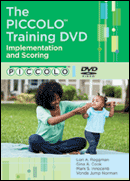This week's readings and lecture on Bronfenbrenner's Ecological Models of Human Development reminded me of a situation recently encountered at work. As part of my work, the team I lead performs developmental screenings for children in order to facilitate identification and intervention for special needs. As our new budget year was starting, we were evaluating to see if we needed another observational tool to help assess families. My colleagues and I were most interested in promoting positive parenting and healthy parent-child interactions, which led us to explore the PICCOLO assessment.
The Parenting Interactions with Children: Checklist of Observations Linked to Outcomes (PICCOLO) is a checklist of nearly thirty observable, developmentally supportive parenting behaviors. The assessment focuses on the youngest children, particularly those between 10 and 48 months of age across several domains. This tool has been described as a positive, practical, versatile, culturally sensitive, valid, and reliable tool for practitioners that shows what parents can do to support their children’s development.
PICCOLO helps practitioners observe a wide range of parenting behaviors that help children develop over time to facilitate an approach known as developmental parenting. By identifying and focusing on parenting strengths, professionals are able to offer support for increasing the developmental resources available to young children and promoting parent skill-building.
The domains assessed by the PICCOLO include affection (warmth, physical closeness, and positive expressions toward child), responsiveness (responding to child’s cues, emotions, words, interests, and behaviors), encouragement (active support of exploration, effort, skills, initiative, curiosity, creativity, and play), and teaching (shared conversation and play, cognitive stimulation, explanations, and questions). Sample questions can be viewed here: http://archive.brookespublishing.com/documents/PICCOLO-sample-items.pdf.
These domains reminded me of the micro system influences which can impact children according to Bronfenbrenner's theory. Asking important questions such as "How does amount and quality of children’s engagement with parents impact their development and learning?" or "How can interaction with children and the quality of parent-child interaction be altered or improved?" are critical in understanding the development of a child. I think this is a great real-life application of the theory and how it truly works outside of "laboratory conditions" in common practice.

No comments:
Post a Comment